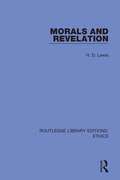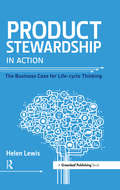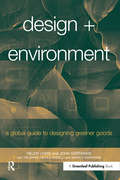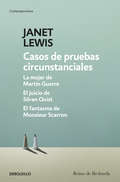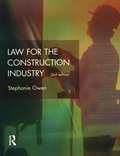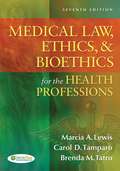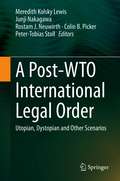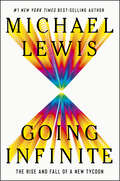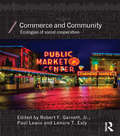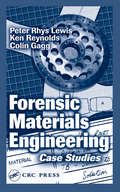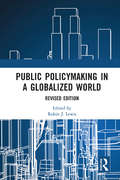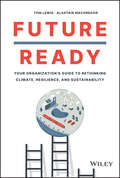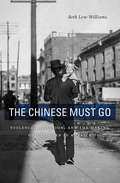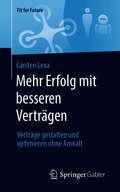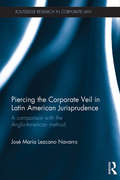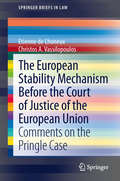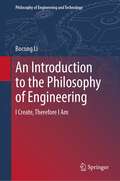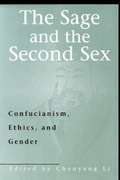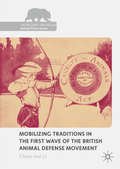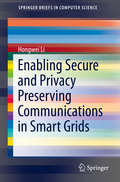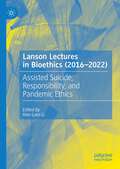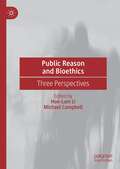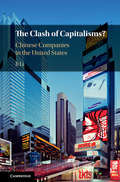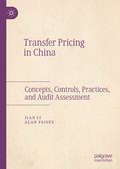- Table View
- List View
Morals and Revelation
by H. D. LewisOriginally published in 1951, this book discusses morality and religion , with special attention being paid to the theologian Emil Brunner. It critically examines the state of ethical thinking in the first half of the twentieth century and examines the question of freedom and guilt particularly in relation to psychological theories. The issue of collective guilt is also subjected to close analysis. The problem of our knowledge of God is also discussed with the focus on mysticism and revelation.
Product Stewardship in Action: The Business Case for Life-cycle Thinking
by Helen LewisProduct Stewardship in Action describes how and why leading companies are taking responsibility for the environmental impact of their products and packaging. Product stewardship, often referred to as "extended producer responsibility" or EPR, is the idea that everyone that benefits commercially from a product, including manufacturers, distributors and retailers, has a shared responsibility to minimize its environmental impacts. Written primarily for a business audience, it draws on the knowledge and experience of industry practitioners and other experts to provide a structured approach to product responsibility within firms. This will help those new to the field, as well as more experienced practitioners, to develop an effective response to stakeholder concerns about the environmental impacts of their products and packaging. Unlike other resources on product stewardship and EPR, which tend to focus on the design or evaluation of public policy, this book highlights the business case for action. It argues that companies can achieve "shared value" — both public and commercial value — when they take a proactive and knowledge-based approach to the life-cycle management of their products. Product Stewardship in Action focuses on product stewardship as an effective business strategy rather than a philanthropic exercise. To be effective it needs to be based on a good understanding of product impacts and stakeholder concerns, and the risks and opportunities that these present to the business. The most effective responses will be those that address material issues in the product life-cycle while supporting the achievement of other corporate goals and priorities.
Design + Environment: A Global Guide to Designing Greener Goods
by Helen Lewis John Gertsakis Tim Grant Nicola Morelli Andrew SweatmanThere is a huge scarcity of good, practical resources for designers and students interested in minimizing the environmental impacts of products. Design + Environment has been specifically written to address this paucity. The book first provides background information to help the reader understand how and why design for environment (DfE) has become so critical to design, with reference to some of the most influential writers, designers and companies in the field. Next, Design + Environment provides a step-by-step approach on how to approach DfE: to design a product that meets requirements for quality, cost, manufacturability and consumer appeal, while at the same time minimising environmental impacts. The first step in the process is to undertake an assessment of environmental impacts, using life-cycle assessment (LCA) or one of the many simpler tools available to help the designer. From then on, DfE becomes an integral part of the normal design process, including the development of concepts, design of prototypes, final design and development of marketing strategies. Environmental assessment tools and strategies to reduce environmental impacts, such as the selection of appropriate materials, are then discussed. Next, some of the links between environmental problems, such as global warming, ozone depletion, water and air pollution and the everyday products we consume are considered. In order to design products with minimal environmental impact, we need to have a basic understanding of these impacts and the interactions between them. The four subsequent chapters provide more detailed strategies and case studies for particular product groups: packaging, textiles, furniture, and electrical and electronic products. Guidelines are provided for each of the critical stages of a product's life, from the selection of raw materials through to strategies for recovery and recycling. Finally, Design + Environment takes a look at some of the emerging trends in DfE that are offering us the opportunity to make a more significant reduction in environmental impacts. Both the development of more sustainable materials and technologies and the growing interest in leasing rather than selling products are examined. Design + Environment is organized as a workbook rather than an academic text. It should be read once, and then used as a key reference source. This clear and informative book will prove to be invaluable to practising designers, to course directors and their students in need of a core teaching and reference text and to all those interested in learning about the tools and trends influencing green product design. The authors have all been involved in an innovative demonstration programme called "EcoReDesign", which was developed by the Centre for Design at RMIT University with funding from the Australian government. The Centre successfully collaborated with Australian companies to improve the environmental performance of their products by following DfE principles.
Casos de pruebas circunstanciales: La mujer de Martin Guerre | El juicio de Sören Qvist | El fantasma de Monsieur Scarron
by Janet LewisLas tres novelas que forman la célebre trilogía de Janet Lewis «Casos de pruebas circunstanciales», reunidas en un solo volumen. La trilogía de Janet Lewis está basada en algunos de los errores judiciales que aparecen en el tratado sobre la Ley de la prueba que el jurista inglés Samuel March Philips escribió en el siglo XIX. Lewis escribió estas novelas a lo largo de dos décadas, fascinada por la forma en que las pruebas circunstanciales y los relatos de los testigos pueden sentenciar el destino de una persona, así como la forma en que la construcción del relato se impone con tal fuerza que amenaza con diluir la realidad o la búsqueda de la verdad. A pesar de la variedad de escenarios y circunstancias, desde el célebre caso de la duplicidad de identidades en La mujer de Martin Guerre, la trágica historia del pastor protestante injustamente ajusticiado en El juicio de Sören Qvist y el trasfondo político en el marco de la gran hambruna de 1693-1694 durante el reinado de Luis XIV en El fantasma de Monsieur Scarron, Janet Lewis refleja con gran maestría la compleja encrucijada entre la ley y la justicia. Crítica:«No errarán demasiado quienes auguran que dentro de un siglo Janet Lewis gozará de un rango similar al de Stendhal y Hawthrone, incluso Flaubert y Melville, en la historia de la literatura.»Javier Marías
Law for the Construction Industry (Chartered Institute of Building)
by J.R. Lewis Stephanie OwenLaw for the Construction Industry provides a comprehensive introduction to the English legal system and basic contract law for those involved in the construction industry. It covers the level 2 module on legal studies of The CIOB's Education Framework and is officially sanctioned by The CIOB as the recognised book for that module. The book assumes no previous knowledge of English law.The second edition has been brought fully up-to-date with the latest legal changes. It explains basic contract law and gives the reader an understanding of employment and consumer law whilst placing law in the context of the construction industry throughout.Law for the Construction Industry is a core textbook for the CIOB level 2 module on legal studies, as well as BTEC HNC/D and degree courses in building and construction management.
Medical Law, Ethics, and Bioethics for the Health Professions (Seventh Edition)
by Marcia A. Lewis Carol D. Tamparo Brenda M. TatroNow in its Seventh Edition, this groundbreaking book continues to champion the "Have a Care" approach, while also providing readers with a strong ethical and legal foundation that enables them to better serve their clients. The book addresses all major issues facing healthcare professionals today, including legal concerns, important ethical issues, and the emerging area of bioethics.
International Economic Law and National Autonomy
by Meredith Kolsky Lewis Susy FrankelInternational commitments may sit uneasily with national pressures in the best of times. This age of economic uncertainty brings these tensions into sharper relief. This volume draws together thirteen analyses of this tension in a wide array of contexts, including each of the three main pillars of the World Trade Organization, international investment law and arbitration, and the international financial institutions. The essays feature internationally recognised experts addressing topical examples of international economic law obligations clashing with domestic political interests. For example, Professor Robert Howse, of New York University Law School, addresses issues of globalization and whether international and national interests can in today's world be considered separate, while Ko-Yung Tung, the former Director-General of the World Bank, looks at trends in investment treaty arbitration and considers what the future may hold in light of the recent financial crisis, the rise of China as an economic powerhouse, and other factors.
A Post-WTO International Legal Order: Utopian, Dystopian and Other Scenarios
by Meredith Kolsky Lewis Colin B. Picker Peter-Tobias Stoll Junji Nakagawa Rostam J. NeuwirthThis book provides readers with a unique opportunity to explore how the international economic legal order (IELO) may look in a post-WTO world. The substance of this book presupposes (whether correct or not) that the WTO either: (a) Stagnates into the foreseeable future (Doha withers, no new Rounds, at best minor amendments, little new jurisprudence, effective collapse of the DSB); or (b) Falls apart completely. While neither is desirable, the book underlines that it must be conceded that neither is inconceivable. The collapse of the Soviet Union tells us that anything is possible (in 1986 no one foresaw the end of the Cold War - clearly it was a much more significant event than would be the case for the demise of the WTO and the current international economic legal order (IELO)). Similarly, just a year or two before Brexit or the election of US President Donald Trump, no one foresaw those two eventualities. Consequently, a worst-case scenario for the future of the WTO cannot be ignored – rather, it must be explored, as has been done in this book. Indeed, despite most IEL academics’ commitment to multilateralism and specifically to a vibrant and dynamic WTO, academics in the field are now beginning to seriously discuss what a post-WTO world could look like (and it was the project behind this book that first launched those discussions). Accordingly, this examination of the post-WTO world will be of great value to practitioners, governmental and international officials and scholars in the IELO. This is particularly so in an era of increasingly rapid change, during which legal scholarship must also address the future if it wants to contribute creative solutions to the resolution and management of the many serious contemporary problems facing our field.
Going Infinite: The Rise And Fall Of A New Tycoon
by Michael LewisAN INSTANT #1 NEW YORK TIMES BESTSELLER One of the New Yorker's Best Books of 2023 • One of Pure Wow's 42 Book to Gift This Year • One of Fortune's Best Crypto Books of 2023 "Going Infinite is in many ways Lewis at his best. He marshals a complex global story without losing sight of the delightful and revealing human details. He is a world-class noticer."—Jesse Armstrong, writer and creator of HBO’s Succession, Times Literary Supplement "A stupefyingly pleasurable book to read." —Gideon Lewis-Kraus, The New Yorker "Going Infinite is an instant classic." — Helen Lewis, The Atlantic "Going Infinite is wildly entertaining, surprising multiple times on pretty much every page, but it adds up to a sad story, even a tragedy, for its central character and for all the people who lost so much thanks to his actions." —John Lanchester, London Review of Books "Will join Digital Gold as one of the all-time best crypto books."—Jeff John Roberts, Fortune "A wry, engaging writer and a gifted storyteller." —Julia M. Klein, Los Angeles Times "It may be easy to take for granted how entertainingly [Michael Lewis] pulls it off again in Going Infinite." —Brett Martin, GQ From the best-selling author of The Big Short and Flash Boys, the story of FTX’s spectacular collapse and the enigmatic founder at its center. When Michael Lewis first met him, Sam Bankman-Fried was the world’s youngest billionaire and crypto’s Gatsby. CEOs, celebrities, and leaders of small countries all vied for his time and cash after he catapulted, practically overnight, onto the Forbes billionaire list. Who was this rumpled guy in cargo shorts and limp white socks, whose eyes twitched across Zoom meetings as he played video games on the side? In Going Infinite Lewis sets out to answer this question, taking readers into the mind of Bankman-Fried, whose rise and fall offers an education in high-frequency trading, cryptocurrencies, philanthropy, bankruptcy, and the justice system. Both psychological portrait and financial roller-coaster ride, Going Infinite is Michael Lewis at the top of his game, tracing the mind-bending trajectory of a character who never liked the rules and was allowed to live by his own—until it all came undone.
Commerce and Community: Ecologies of Social Cooperation (Economics as Social Theory)
by Paul Lewis Robert F. Garnett Lenore T. EalySince the end of the Cold War, the human face of economics has gained renewed visibility and generated new conversations among economists and other social theorists. The monistic, mechanical "economic systems" that characterized the capitalism vs. socialism debates of the mid-twentieth century have given way to pluralistic ecologies of economic provisioning in which complexly constituted agents cooperate via heterogeneous forms of production and exchange. Through the lenses of multiple disciplines, this book examines how this pluralistic turn in economic thinking bears upon the venerable social–theoretical division of cooperative activity into separate spheres of impersonal Gesellschaft (commerce) and ethically thick Gemeinschaft (community). Drawing resources from diverse disciplinary and philosophical traditions, these essays offer fresh, critical appraisals of the Gemeinschaft / Gesellschaft segregation of face-to-face community from impersonal commerce. Some authors issue urgent calls to transcend this dualism, whilst others propose to recast it in more nuanced ways or affirm the importance of treating impersonal and personal cooperation as ethically, epistemically, and economically separate worlds. Yet even in their disagreements, our contributors paint the process of voluntary cooperation – the space commerce and community – with uncommon color and nuance by traversing the boundaries that once separated the thin sociality of economics (as science of commerce) from the thick sociality of sociology and anthropology (as sciences of community). This book facilitates critical exchange among economists, philosophers, sociologists, anthropologists, and other social theorists by exploring the overlapping notions of cooperation, rationality, identity, reciprocity, trust, and exchange that emerge from multiple analytic traditions within and across their respective disciplines.
Forensic Materials Engineering: Case Studies
by Peter Rhys Lewis Ken Reynolds Colin Gagg Colin GaggMost books on forensic engineering focus on civil engineering failures rather than consumer or general mechanical products. Unique both in scope and style, this treatment is built upon case studies of real accidents, broadly focused on consumer products, and dedicated to problem solving through scientific principles. Each well-illustrated case stud
Public Policymaking in a Globalized World: Revised edition
by Robin J. LewisThe inexorable advent of globalization has transformed the public policymaking process into a multi-faceted challenge that transcends traditional policymaking boundaries and forces scholars, experts, and practitioners to redefine their field in terms of both theory and practice. While every policy dilemma has a specific location in time and space, most significant policy issues— climate change, food and water, economic development, global pandemics, terrorism and violence, and migration, to name just a few—now require a collective framing of the problem and a collaborative effort to take effective action. The essays in Public Policymaking in a Globalized World offer valuable insights into how policymaking is evolving from a circumscribed field of inquiry into a truly global dialogue that can help stakeholders to focus on key issues that threaten the survival of our planet.
Future Ready: Your Organization's Guide to Rethinking Climate, Resilience, and Sustainability
by Tom Lewis Alastair MacGregorRethink climate, resilience, and sustainability for your organization In Future Ready: Your Organization’s Guide to Rethinking Climate, Resilience, and Sustainability, a team of business leaders with deep expertise in engineering, planning, finance, project, program implementation and advisory consulting perspective delivers an essential guide for executives, managers, and other business and infrastructure organization leaders to set and implement a resilience, sustainability and ESG strategy in complex project and operating environments. Through practical examples and proven insights, readers will learn to proactively engage with stakeholders, successfully plan, implement, and measure the impacts of their initiatives, and effectively communicate the results. In the book, the authors draw on hundreds of completed projects across a full range of client organizations, markets, sectors, and scales to equip readers with unprecedented insights and the behind-the-scenes work that went into making the projects successful. The authors also include: Strategies for identifying, cataloguing, and reporting risks—from the operational to the physical and transactional—as well as explanations of how climate risk scenarios can reveal hidden opportunities and unexpected vulnerabilities A Future Ready mindset and the specific examples of organizational sustainability and climate adaptation commitments and the paths companies have taken to meet their goals Critical questions that leaders must ask of themselves and their organizations before they begin a climate, resilience, and/or sustainability initiativeA must-read guide for executives, board members, ESG professionals, and other business and infrastructure organization leaders, Future Ready belongs in the hands of anyone who finds themselves responsible for helping an organization achieve their environmental, social, and governance goals.
The Chinese Must Go: Violence, Exclusion, And The Making Of The Alien In America
by Beth Lew-WilliamsBeth Lew-Williams shows how American immigration policies incited violence against Chinese workers, and how that violence provoked new exclusionary policies. Locating the origins of the modern American “alien” in this violent era, she makes clear that the present resurgence of xenophobia builds mightily upon past fears of the “heathen Chinaman.”
Mehr Erfolg mit besseren Verträgen: Verträge gestalten und optimieren ohne Anwalt (Fit for Future)
by Carsten LexaDieses Buch ist für alle, die auf einfache Weise mehr Erfolg mit Verträgen erreichen wollen, ohne einen Anwalt zu bemühen. Die Folgen sind mehr Rechtssicherheit, weniger Streit und bessere Beziehungen der Vertragsparteien. Anhand von Beispielen als dem Alltag wird gezeigt, welche Fehler im Umgang mit Verträgen gemacht werden, welche Folgen sich daraus ergeben und wie Fehler vermieden werden können. Formulierungsvorschläge aus der Praxis helfen, ein besseres Verständnis von den Problemen und den Lösungsmöglichkeiten zu erhalten. Mit wertvollen Tipps aus der Praxis zur Gestaltung besserer Verträge!
Piercing the Corporate Veil in Latin American Jurisprudence: A comparison with the Anglo-American method (Routledge Research in Corporate Law)
by Jose Maria LezcanoThis book is a comparative law study exploring the piercing of the corporate veil in Latin America within the context of the Anglo-American method. The piercing of the corporate veil is a remedy applied, in exceptional circumstances, to prevent and punish an inappropriate use of the corporate personality. The application of this remedy and the issues it involves has been widely researched in Anglo-American jurisdictions and, until recently, little attention has been given to this subject in Latin America. This region has been through internal political conflicts that undermined economic development. However, rise of democratic governments has created the political stability necessary for investment and economic development meaning that the corporate personality is now more commonly used in Latin America. Consequently, corporate personality issues have become a subject of study in this region. <P><P>Drawing on case studies from Mexico, Colombia, Brazil and Argentina, Piercing the Corporate Veil in Latin American Jurisprudence examines the ingenuity of Latin American jurisdictions to deal with corporate personality issues and compares this method with the Anglo-American framework. Focusing in particular on the influence of two key factors- legal tradition and the uniqueness of each legal system- the author highlights both similarities and differences in the way in which the piercing of the corporate veil is applied in Latin American and Anglo-American jurisdictions. <P><P>This book will be of great interest to scholars of company and comparative law, and business studies in general.
The European Stability Mechanism Before the Court of Justice of the European Union
by Etienne Lhoneux Christos A. VassilopoulosThis book provides an analysis of the judgment of the Court of Justice of the European Union in the Pringle case. It focuses on the three main aspects of the ruling. First, it examines the part of the judgment concerning the validity of the European Council Decision 2011/199 - adopted under the simplified revision procedure (Article 48(6) TEU) - which provides for the possibility to establish a financial stability mechanism. Second, it evaluates the new rules developed by the Court in order to interpret agreements concluded exclusively by the member states, such as the ESM Treaty. Third, it assesses the Court's interpretation of the main provisions of the so-called economic pillar of the Economic and Monetary Union and the fundamental rules provided for by the Treaties (nature of competence, financial assistance, institutional balance, judicial review charter of fundamental rights etc. ) with regard to the ESM treaty provisions.
An Introduction to the Philosophy of Engineering: I Create, Therefore I Am (Philosophy of Engineering and Technology #39)
by Bocong LiThis book is the first academic work on the philosophy of engineering in China that reflects two decades of research. It puts forward a new thesis, namely that the core maxim in the philosophy of engineering is “I create, therefore I am,” which is radically different from the Cartesian maxim: “I think, therefore I am.” In addition, the book offers the first detailed portrait of the roots and evolution of the philosophy of engineering in China. The book begins by discussing the triptych thesis of science, technology and engineering, which argues that there are a number of important distinctions between the three, e.g. scientific activities are chiefly based on discovery, while technological activities center on invention, and engineering activities focus on creation. Considering the latest developments in the philosophy of engineering, the author also analyzes engineering communities, engineering practice and a micro–meso–macro framework. In subsequent chapters, the author separately analyzes the three stages of engineering activities: planning, operating and using artifacts. In the closing chapter, two views on the philosophy of engineering (as a new subdiscipline of philosophy and as a philosophy in its own right) are briefly explained.
The Sage And The Second Sex: Confucianism, Ethics, and Gender
by Chenyang LiThis volume offers new insights into the role of women in ancient China, their important contributions to society, and their pursuit of personal growth and fulfillment. The position that Confucianism may actually foster gender equity is particularly interesting in discussions of whether the Confucian worldview is degrading or repressive toward women.
Mobilizing Traditions in the First Wave of the British Animal Defense Movement (The Palgrave Macmillan Animal Ethics Series)
by Chien-hui LiThis book explores the British animal defense movement’s mobilization of the cultural and intellectual traditions of its time- from Christianity and literature, to natural history, evolutionism and political radicalism- in its struggle for the cause of animals in the nineteenth and early twentieth centuries. Each chapter examines the process whereby the animal protection movement interpreted and drew upon varied intellectual, moral and cultural resources in order to achieve its manifold objectives, participate in the ongoing re-creation of the current traditions of thought, and re-shape human-animal relations in wider society. Placing at its center of analysis the movement’s mediating power in relation to its surrounding traditions, Li’s original perspective uncovers the oft-ignored cultural work of the movement whilst restoring its agency in explaining social change. Looking forward, it points at the same time to the potential of all traditions, through ongoing mobilization, to effect change in the human-animal relations of the future.
Enabling Secure and Privacy Preserving Communications in Smart Grids
by Hongwei LiThis brief focuses on the current research on security and privacy preservation in smart grids. Along with a review of the existing works, this brief includes fundamental system models, possible frameworks, useful performance, and future research directions. It explores privacy preservation demand response with adaptive key evolution, secure and efficient Merkle tree based authentication, and fine-grained keywords comparison in the smart grid auction market. By examining the current and potential security and privacy threats, the author equips readers to understand the developing issues in smart grids. The brief is designed for researchers and professionals working with computer communication networks and smart grids. Graduate students interested in networks and communication engineering will also find the brief an essential resource.
Lanson Lectures in Bioethics (2016-2022): Assisted Suicide, Responsibility, and Pandemic Ethics
by Hon-Lam LiBioethical issues are practically urgent, politically divisive, and call for resolutions. They often involve questions that are perplexing, deep, and profound. To deal with them adequately requires philosophical tools and imagination. The Lanson Lectures in Bioethics were founded upon the belief that philosophical elucidation can clarify the nature of these difficult issues, and can lead to their resolution. The present volume collects the first five lectures delivered by five preeminent moral philosophers between 2016 and 2022. In the inaugural lecture, Jonathan Glover draws a distinction between two conceptions of dignity, and brings it to bear on the issues of assisted suicide, embryo research, and genetic choices. F. M. Kamm argues that doctors are morally permitted to intentionally cause death, or assist in its being intentionally caused, when either death is imminent anyway and intentionally causing it can alone stop the pain, or if the patient has already decided—not unreasonably—that death is his least bad option. Are smokers who contract lung cancer entitled to state-supported healthcare? T. M. Scanlon argues that the reasons that individuals have for wanting to have the opportunity to engage in activities involving risks need to be compared with the costs society has to bear to provide healthcare for those who suffer illness or injury as a result of these activities. Rejecting Strawson’s view that a psychiatrist can only “treat” an insane patient, Victor Tadros argues that it is often right to reason with (nonresponsible) mentally ill persons because a psychiatrist needs to see things from their perspectives, and that we should communicate to nonresponsible agents that their wrongdoing is a problem for them and for their victims. Peter Singer proposes solutions to the following questions: How to distribute scarce medical resources and vaccines ethically? Whether to relax the standard for volunteers willing to participate in vaccines research? How to compare the trade-off between saving lives and saving the economy regarding lockdowns? How to prevent pandemics in future?Each lecture is followed by a critical commentary by a moral philosophers or physician in Asia. Each commentary (except the inaugural lecture) is followed by a rejoinder.
Public Reason and Bioethics: Three Perspectives
by Hon-Lam Li Michael CampbellThis book explores and elaborates three theories of public reason, drawn from Rawlsian political liberalism, natural law theory, and Confucianism. Drawing together academics from these separate approaches, the volume explores how the three theories critique each other, as well as how each one brings its theoretical arsenal to bear on the urgent contemporary debate of medical assistance in dying. The volume is structured in two parts: an exploration of the three traditions, followed by an in-depth overview of the conceptual and historical background. In Part I, the three comprehensive opening chapters are supplemented by six dynamic chapters in dialogue with each other, each author responding to the other two traditions, and subsequently reflecting on the possible deficiencies of their own theories. The chapters in Part II cover a broad range of subjects, from an overview of the history of bioethics to the nature of autonomy and its status as a moral and political value. In its entirety, the volume provides a vibrant and exemplary collaborative resource to scholars interested in the role of public reason and its relevance in bioethical debate.
The Clash of Capitalisms?: Chinese Companies In The United States
by Ji LiChinese foreign direct investment in the United States has generated intense debates. Some welcome it for the immediate benefits such as job creation; others view Chinese investments, especially those controlled by the Chinese government, as a critical threat. The debates have so far missed an important question: how do Chinese companies investing in the US react to the host country's law? <P><P>Ji Li formulates a novel analytical framework to examine the adaptation of Chinese companies to general US institutions and their compliance with US laws governing tax, employment equality, and national security review of foreign investments. The level of compliance varies, and this variation is examined in relation to company ownership, including state ownership. Li's analysis is based on interviews and a unique and comprehensive dataset about Chinese companies in the United States that has never been systematically explored.<P> Proposes a new analytical framework for researching foreign investors' compliance with host country law.<P> Draws on a unique dataset covering almost all the largest Chinese companies in the US.<P> Combines qualitative and quantitative analysis.<P>
Transfer Pricing in China: Concepts, Controls, Practices, and Audit Assessment
by Jian Li Alan PaiseyThis book offers up to date insights into the exciting world of China’s extensive economic activity through the pervasive and often secretive practice of transfer pricing. It begins with an explanation of transfer pricing itself and goes on to explore how intricately it can infiltrate the trading practices of the commercial lives of both foreign companies in China and Chinese companies expanding to other countries. A review of the main industries in China also considers their possible future uncertainties. China has joined other authorities in actively legislating and organizing a regime to implement its arm’s length policy, as related in Part I of the book on concepts and controls. This is then followed by Part 2 which is devoted to a collection of cases showing the breadth and variability of companies actively seeking to maximise their profits, while Part 3 of the book gives a rare record of the order of priorities exercised by one hundred Chinese tax officers engaged in auditing company performance. The book ends with a summary of the future trends, and activities that regulatory authorities are likely to undertake.
